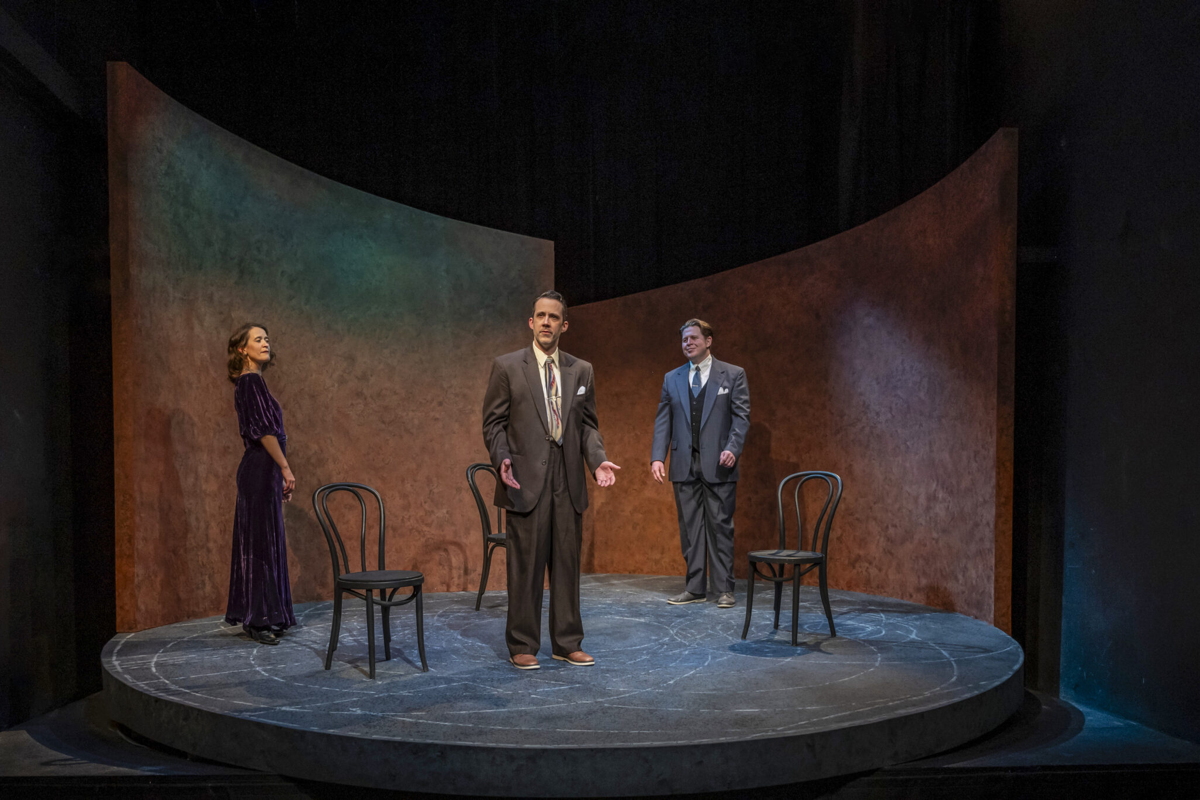
An utterly gripping "Copenhagen" at St. Louis Actors' Studio
By Steve Callahan
English playwright Michael Frayn is so very, very versatile! He wrote that hysterically funny “Noises Off,” which garnered Tonys and many other major awards. It’s the definitive sex-farce.
And he wrote the current offering at the St. Louis Actors’ Studio, “Copenhagen” (also a winner of Tony’s, etc.) It’s the definitive (i.e., the only) drama about nuclear physics. It’s deeply intellectual—cerebral—and overflowing with dense theory about the behavior of electrons, neutrons, and other subatomic crumbs in a world where “relativity”, the “uncertainty principle”, and “quantum mechanics” have knocked the foundation from under the entirety of physical science. Causality itself has come into question.
The play is utterly gripping! I didn’t want even to blink!
We see a gorgeously simple set by Patrick Huber—a round blue-gray platform backed by tall, curved walls in a rich rust color—with three black bent-wood chairs. That’s it. A gorgeous, melancholy string quartet plays as the lights rise and the players enter.
Werner Heisenberg, Neils Bohr, and Bohr’s wife Margarethe are all dead now, but their spirts are drawn back to this ghost of a remembered Copenhagen—to explore the motives and ramifications of a mysterious visit Heisenberg made to Bohr in 1941. Bohr had been his mentor and colleague, but now (1941) Heisenberg is a professor in Leipzig working on the German nuclear energy program. Germany has occupied Denmark but has not yet expelled the Jews. (Bohr is, as he says, “half Jewish”.)
The cast at Actors’ Studio is wonderfully strong. Joel Moses plays Heisenberg, Aaron Orion Baker is Bohr, and Lizi Watt is Margarethe. All three give flawless, deeply committed performances.
These are smart people. Bohr won his Nobel prize in 1922; Heisenberg won his in 1932. Their early days together were in a frenzied, joyous, combative, exhilarating and richly productive scramble toward the very limits of scientific knowledge.
On stage we drift back and forth in time. The conversation winds from hotly debated current questions in atomic theory, to fond memories of the men’s former work together and stories of their old pastimes—alpine hiking, skiing, table tennis. The Bohrs’ tragic loss of a young son in a sailing accident is revisited again and again. And always they must try to understand the true reason for Heisenberg’s visit. Was it to pick Bohr’s brain about America’s atomic project, with which he has some contact? Was it to recruit Bohr to persuade America to cease its weaponizing effort? Was it to get his mentor’s moral support for Heisenberg’s secretly squelching Germany’s program?
Can each of these reasons be true and not true at the same time? (Schrödinger’s famous imaginary cat could be both alive and dead at the same instant.) And does the true reason depend, as in relativity, on the observer’s perspective? Such theoretical concepts are shown to have analogs in human thought and relations.
Conversation must be guarded in this house which may be bristling with Nazi microphones.
Very often, in remembering a past incident, the men disagree over where it was, or when—or who said what to whom. Often in these cases the Margarethe chimes in with perhaps a more accurate version of things. Margarethe’s presence is a double blessing to the audience, for whenever the theory gets just too abstract Bohr insists that they must be able to express the idea in “plain talk” that Margarethe (and we) can understand.
It's a wonderful, most unusual play investigating profound moral questions. Come to it ready to think. At the end of the evening your brain may hurt, but it will be just a little bit larger.
Director Wayne Salomon shows a masterful hand with this beautiful, challenging piece.
The St. Louis Actors’ Studio production of “Copenhagen” plays at the Gaslight through February 25th.


